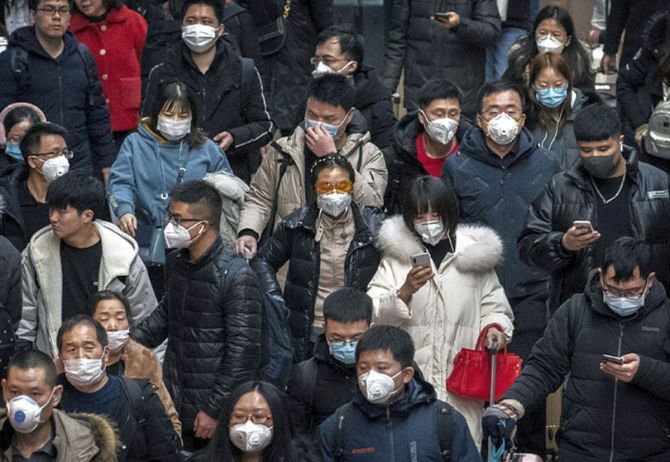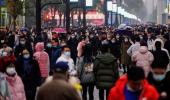China's ruling Communist Party on Monday again tweaked its strict two-child policy to allow all couples to have up to three children, in a major policy change to head off a worsening labour shortage that could seriously impact the world's second largest economy's further rise.

China, the world's most populous nation, permitted all couples to have two children in 2016, scrapping the draconian decades-old one-child policy which policymakers blame for the current demographic crisis in the country.
But the 2016 tweak to its one-child policy seems to have failed to lead to a sustained upsurge in births. The cost of raising children in cities has deterred many Chinese couples from having more than one child.
Chinese officials claim the one-child policy implemented for over three decades has prevented over 400 million births.
The decision to permit the third child came after this month's once-in-a-decade census showed that China's population grew at the slowest pace to 1.412 billion amid official projections that the decline may begin as early as next year.
The new census figures revealed that the demographic crisis China faced was expected to deepen as the population above 60 years grew to 264 million, up by 18.7 per cent last year.
As the calls for the government to do away with the family planning restrictions grew louder due to the concerns that the declining population in the country could result in serious labour shortages negatively impacting the world's second-largest economy, the Communist Party of China headed by President Xi Jinping decided to permit a third child while declining to completely scrap the family planning policy.
"China will support couples that wish to have a third child," state-run Xinhua news agency reported, quoting a decision made at the Politburo of the CPC, presided over by President Xi.
"Implementing the policy and its relevant supporting measures will help improve China's population structure, actively respond to the aging population, and preserve the country's human resource advantages," the meeting said.
The meeting heard reports on major policy measures to actively address the ageing of population during the 14th Five-Year Plan period (2021-2025).
It reviewed a decision on improving birth policies to promote long-term balanced population growth, the Xinhua report said.
"Data shows the aging of the Chinese population has further deepened, and we will continue to face the pressure to achieve long-term balanced population development," Ning Jizhe, head of the National Bureau of Statistics, said while releasing the census figures on May 11.
The poor response made Liang Jianzhang, professor at Peking University's School of Economics, to suggest to the government to offer parents one million yuan (USD 156,000) for each newborn child to shore up the country's declining birth rate.
Experts have said China's labour force will peak in the next few years before shrinking by about 5 per cent over the next decade.
"The demographic dividend that propelled the country's economic rise over recent decades is set to dissipate quickly," said Yue Su, an economist at the Economist Intelligence Unit in London, in remarks published earlier this month.
That could mean trouble for the big economic policy objectives set by President Xi, who has laid out ambitions for China's GDP to double by 2035. China also hopes to surpass the United States as the world's biggest economy by the end of this decade.
Human rights organisation Amnesty International said China's policy, like its predecessors, was still a violation of sexual and reproductive rights.
"Governments have no business regulating how many children people have. Rather than 'optimising' its birth policy, China should instead respect people's life choices and end any invasive and punitive controls over people's family planning decisions," said the group's China team head, Joshua Rosenzweig.
Dan Wang, chief economist at Hang Seng Bank (China), said the three-child policy would have a positive impact on China's birth rate, but not as much as the authorities hoped for.
Wang said that when China replaced its one-child policy with a two-child policy in October 2015, the birth rate rose immediately but the impact of the policy dissipated after three years.
"The high costs of housing and education, as well as a lack of job protection for women, are strong economic constraints on having children," she said, adding that the cost of having a third child would be too high for most middle-class families", he told the Hong Kong based South China Morning Post.
The declining trend prompted Chinese demographers to predict that India's population may overtake China's earlier than UN projection of 2027 to take the top spot as the most populous country in the world.
Projected to surpass China as the world's most populous country around 2027, India is expected to add nearly 273 million people between now and 2050 and will remain the most populated country through the end of the current century, a UN report said in 2019.
The UN report stated that in 2019, India had an estimated population of 1.37 billion and China 1.43 billion and by 2027 India's population is projected to surpass China's.
China is also facing the risk of falling into the trap of low fertility, as it recorded 12 million births in 2020, marking a drop for the fourth consecutive year.
China's total fertility rate of women of childbearing age was 1.3, a relatively low level.
A recent report by China's central bank -- the People's Bank of China -- said demographics of China is set to change as its population growth enters negative growth after 2025, which will result in shortage of consumer demand.
"When the total population enters negative growth [after 2025], there will be a shortage of demand. We need to pay attention to the impact of demographics on future consumption," said Cai Fang, a member of the monetary policy committee of the PBOC.
The PBOC study said China should immediately liberalise its birth policies or face a scenario in which it has a lower share of workers and higher burden of elderly care than the US by 2050.
It said the country should not interfere with people's ability to have children or it will be too late to reverse the economic impact of a declining population.
China is also eyeing a progressive, flexible and differentiated path to raising the retirement age.
According to the Outline of the 14th Five-Year Plan, China will take small steps to raise the retirement age.











 © 2025
© 2025